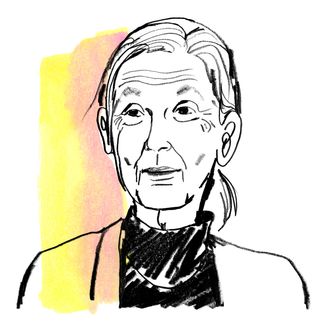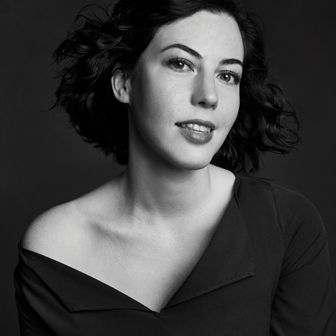
Dame Jane Goodall, 83, is a world-renowned primatologist and environmental and animal-rights activist. She’s also the subject of the new documentary, Jane, which is made up of 140 hours of previously unseen footage from her early days in Tanzania. Here, the scientist shares how she gets it all done.
On a typical morning: I spend 300 days a year on the road, so it’s different every day. In the old days, when I was studying the chimps, it was getting up at 5:30 a.m. before it was light and climbing to where the chimps slept at night, and then following them all day. Now, I sometimes have to get up very early to catch a plane or prepare a lecture. I just about always start working at 6:30 a.m. — checking emails, writing bits and pieces, finishing thank-you letters, and so on. For breakfast I’ll have a bit of toast and a cup of coffee.
On home: If I’m based anywhere, the house I grew up in is in Bournemouth, England. My sister actually still lives there. So that’s where I go between tours. But those visits are very short.
On disconnecting: I don’t have a cell phone. I don’t want people to be able to catch me all day when I’m already almost too busy to survive a day. I like to choose, and calls are monitored — they go through an assistant. But I’ll answer emails anytime I have a few minutes to spare, which is sometimes on the plane, sometimes at 1 a.m., using my little laptop.
On sustainable travel: I try to be completely independent when I travel, so I don’t have to order room service. I take stuff with me to boil water if there isn’t a kettle in the room, and I save a roll from the previous day so I can have it for breakfast. I carry marmite with me so I can put it on that half piece of bread for breakfast. I try to be self-sustaining and leave as small an ecological footprint as I can. If I must use a plastic bag, it’s a bin liner that’s in the room. But I try to take a big envelope and put my trash in there, as plastic goes into landfills and kills animals. I don’t let maids into my room so that they don’t throw anything away.
On jet lag: I don’t acknowledge jet lag. I just work with the sun.
On stress: By nature, I have cultivated a way that I don’t get stressed very often. I’m able to concentrate on what’s happening right now. If one’s calm, then it’s easier to deal with whatever the problem is. I don’t consider my life stressful, although there are times when it is. For instance, you have to get somewhere for an important meeting and the flight isn’t on time, and that’s stressful. So how do you cope with it? By finding the best solution you possibly can. And maybe the solution is just that it wasn’t meant to happen.
On leisure: The only time that I’m not working is when I am at home. I spend the evening with my sister and my family, and I take whatever dog is there on a walk. I’ve got no time for hobbies. What is a weekend? It doesn’t exist. What is a holiday? It doesn’t exist. I can’t even have a pet — if you’re 300 days a year traveling all over the place, how can you have a pet? The one thing I really miss is having a dog.
On lecturing: I don’t feel particularly happy at the moment because we’re destroying the world so fast. If we don’t change attitudes, there will not be much of the world that I love left. I am compelled to carry on at this rate despite being the age of 83. The benefit is that I have been given the gift of communication; when I give lectures, people listen, and it’s changing attitudes, people have told me.
On our impact: Every single one of us makes some impact on the planet every single day, and we have a choice as to what sort of impact we want to make. If we don’t learn to live more sustainably, stop using plastic, go onto green energy, stop fracking, and stop mining in the Amazon and the Antarctic, then there will not be a lot left in the future. We are in many places using up nature’s finite resources more quickly than nature can restore them. We’ve got to have a change of attitude rather fast. That’s what compels me to travel.
On media attention: The media is very important to me because it’s the medium that can spread messages. We try to get the media to not just concentrate on the doom and gloom, but also the wonderful people and wonderful things that are happening in the world, because if people lose hope and think there’s nothing they can do, then they give up and do nothing. If people give up, then there’s no point in working at all.
On using a Kindle: I could use a Kindle on the plane. There are times when I’m totally exhausted when traveling, but I can pick out some sappy romantic books or I can start reading one of my favorite Shakespeare plays on the Kindle, whereas I can’t carry a lot of books with me. Usually I’m doing emails, but sometimes the laptop runs out of energy, and sometimes the eyes run out of energy from looking at the screen. But the Kindle you can enlarge text on the screen.
On advice for young people in science: Money is getting short and competition is stiff, so you really have to want it. But the main thing is, if it’s really your passion, you shouldn’t give up. Even if you can’t immediately do what you want to do, then do something that gives you the opportunity to make some money, and keep your ears open for any opportunity that allows you to pursue your dream.





